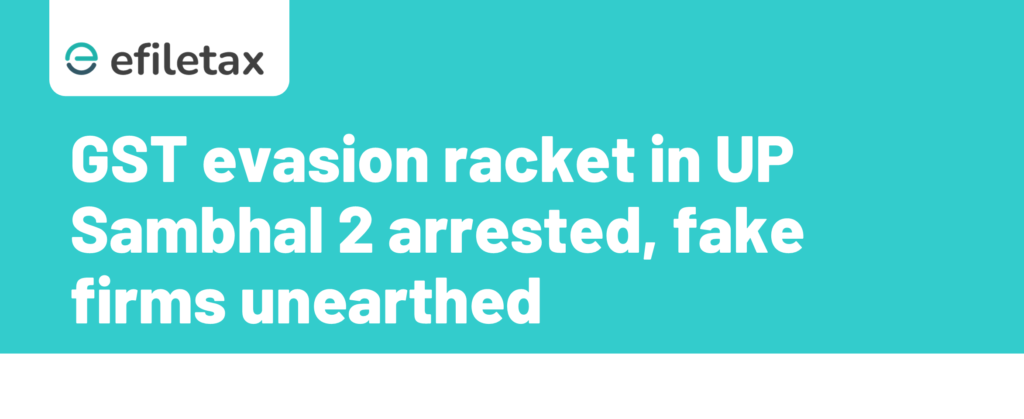
GST evasion racket in UP’s Sambhal Key facts decoded
In a major crackdown, the Directorate General of GST Intelligence (DGGI) has busted a GST evasion racket in UP Sambhal, arresting two individuals for creating fake firms and availing fraudulent Input Tax Credit (ITC).
This blog simplifies the case, explains the GST implications, and helps businesses avoid such compliance traps.
What happened in the Sambhal GST racket?
These were used to:
- Issue fake GST invoices
- Pass on Input Tax Credit without actual supply
Modus operandi:
- Used Aadhaar and PAN of unknown persons
- Opened bank accounts in their names
- Created e-way bills without moving goods
- Claimed and passed on ITC to real businesses
Legal action taken by DGGI
- Section 132(1)(b) and 132(1)(c) of the CGST Act, 2017
- Offences are cognizable and non-bailable under Section 132(5) for tax evasion above ₹5 crore
The arrested persons were sent to judicial custody under remand orders.
Relevant Legal Provisions:
| Section | Description |
|---|---|
| 132(1)(b) | Issue of invoices without supply of goods or services |
| 132(1)(c) | Availing ITC using such invoices |
| 132(5) | Offences over ₹5 crore are cognizable and non-bailable |
Expert view: Why this matters for genuine businesses
Fake ITC scams hurt honest taxpayers in multiple ways:
- Disrupt the credit chain, causing input mismatch notices
- Invite audit, summons, or DRC-01A from the department
- Delay in refund claims or blockage of working capital
Expert Tip:
“Always verify your vendors’ GSTIN status on the GST Portal. Ensure they file GSTR-1 and GSTR-3B on time and reflect your invoices in their returns.”
How to avoid falling into fake ITC traps
- Use only verified vendors: Check for GST registration, PAN validation, and return filing history
- Reconcile GSTR-2B monthly: Match ITC claimed vs reflected
- Avoid cash payments: Use digital transfers for traceability
- Report suspicious entities: You can file complaints directly on the CBIC’s Anti-evasion portal
Government’s larger crackdown on GST frauds
This case is part of a nationwide DGGI drive that started in FY 2023–24 to curb fake billing networks.
As per CBIC stats:
- Over 6,000 fake firms detected in past 12 months
- ₹70,000 crore of ITC fraud under scanner
- Over 500 arrests made under CGST Act
Summary
GST evasion racket in UP’s Sambhal: DGGI busts ₹15 crore fraud using fake firms. Two arrested under CGST Act. Learn how to protect your business from ITC traps and stay GST compliant.
FAQ – GST Evasion in India
Q1: What is fake ITC under GST?
A: Input Tax Credit claimed on invoices where no actual supply took place or vendor didn’t pay tax.
Q2: Is GST fraud a criminal offence?
A: Yes, under Section 132 of the CGST Act, it may lead to arrest and imprisonment.
Q3: How can I check if a supplier is fake?
A: Verify GSTIN, return filing status, and invoice reflection in your GSTR-2B.
Q4: Can ITC be blocked for a genuine buyer?
A: Yes, if the vendor is involved in fraud, the buyer’s ITC may be challenged or reversed.